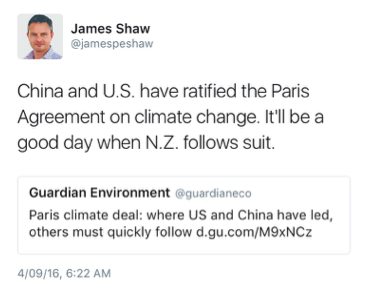Amicus Curiae: Vive La Environmental Révolution! When Will the Paris Agreement be Ratified?
By Meg Williams
Last year our Prime Minister flew to Paris and signed an international treaty. This treaty was a commitment to reducing New Zealand’s carbon emissions, with the goal of keeping global warming to below two degrees celsius. It was labelled a historic turning point in the goal of reducing the world’s carbon emissions. Social media was bursting with positivity: this was it. This was how we as a global community would finally set the world on the right track. It was going to be like the closing credits scene of the Pixar movie Wall-E, where a large community of people return to the damaged and tired earth and begin to plant trees and rebuild an environmentally sustainable earth, all to an up-beat Peter Gabriel song.
"March in Paris for the climate!"
Here’s the disappointing news, though. The Paris Agreement did not include any binding enforcement mechanisms. The Prime Minister returned to New Zealand and continued business as usual. New Zealand currently only has one central Government-level initiative to reduce the country’s carbon emissions: the Emissions Trading Scheme. Equal Justice Project volunteer Chris Ryan detailed this scheme in his piece about New Zealand’s climate change dedications, and also highlighted some of the major issues with New Zealand’s use of the scheme involving ethics and environmental integrity, which has effectively meant that New Zealand has not been taking real action.
Here’s the uplifting news. Generation Zero, a youth-led NGO, has begun a campaign for a Zero Carbon Act, a bill that they are drafting which would ratify the Paris Agreement and commit the New Zealand Government to reduce carbon pollution to close to zero by 2050. Generation Zero agrees that carbon trading schemes aiming to incentivise businesses to go down more environmentally conscious routes are on the right track, but thinks that they do not replace the need to actually reduce the amount of carbon the country is emitting. “We need a new law to put New Zealand on track to zero carbon by 2050: a Zero Carbon Act.”
Sick of waiting for the Government to form their own ratification of the Paris Agreement, Generation Zero has set off drafting a bill with help from “experts and collaborators.” In practice, the law would work very much the same as the UK’s Climate Change Act, which, rather than forcing the Government to take on specific policies, provides a legal framework in which the Government can work to achieve change. This framework includes a target, a pathway—“a system of binding ‘carbon budgets’ set at least 15 years in advance”—a requirement that the Government create a policy plan to achieve the goal, and a monitoring framework with an independent body which makes recommendations about carbon budgets and actions. The Act also aims to be flexible enough that the government of the day can choose its policies, but the inclusion of the independent body also means that the government of the day still remains accountable, and aims to achieve cross-party consensus on the best ways to hit targets.
The framework is all there ready for us to modify for our own country. A ratification of the Paris Agreement would be a huge step towards New Zealand achieving carbon emission goals. All that is left for NZ to do now is simply to follow frameworks that have been laid out around the world and make use of them in our own country in order to be at zero carbon by the year 2050, creating a clean environment that Wall-E would be proud of.
Generation Zero’s campaign for a Zero Carbon Act can be supported through donations in order to fund the legal fees needed to write the bill and the resources needed “to mobilise thousands of people between now and the next election to call on our political leaders to pass this Act.”
–
The views expressed in the posts and comments of this blog do not necessarily reflect those of the Equal Justice Project. They should be understood as the personal opinions of the author. No information on this blog will be understood as official. The Equal Justice Project makes no representations as to the accuracy or completeness of any information on this site or found by following any link on this site. The Equal Justice Project will not be liable for any errors or omissions in this information nor for the availability of this information.


